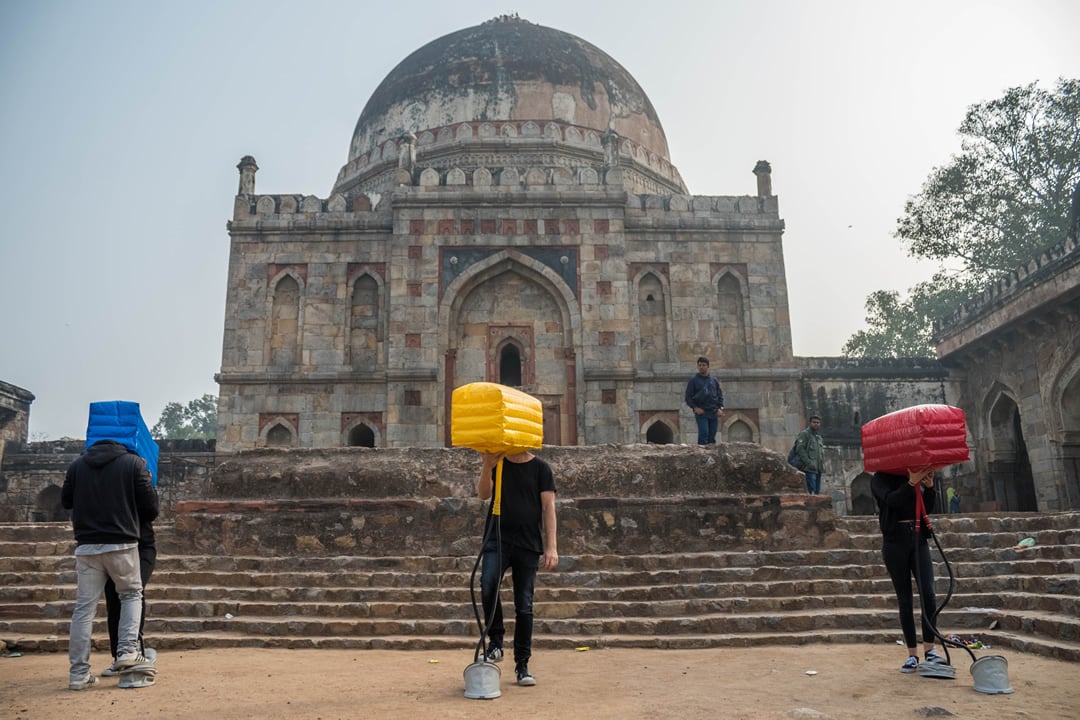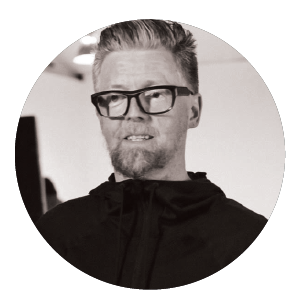Meet the School of Communication and Creative Arts
Today we speak with David Cross: Professor in Visual Arts at Deakin and all round extraordinaire. Working as an artist, curator and writer, David’s practice extends across performance, installation, sculpture, public art and video.
What do you teach at Deakin?
David: I teach across a range of visual arts and art and performance units including public art, abstraction and also the exciting and still reasonably new common unit in first year that all of our dance, drama, visual art and photography students take. I also have quite a few PhD students who are investigating a variety of interesting new research into art and its ability to impact on society.
How would you describe your creative practice?
David: I guess I could be described as a restless artist in that I work across quite a few mediums including installation, sculpture, performance and participatory art as well as photography and video. More recently I have started working in the dance world which is an exciting new direction. I often work with inflatable structures that my body or the audience are invited to engage with. Sometimes these structures invite individual engagement and others are designed for larger groups including unusual activities that link art and sport. I am interested in play as a key component of learning about oneself and at the same time the works are configured to challenge peoples limits and personal thresholds. The work keeps picking away at the possible role art can play in building personal and wider social resilience while also seeking to activate inter-personal exchange between myself and participants. I also work as a curator of public art projects, mostly temporary projects that examine how ideas of time and place might offer us new understandings of the world. In conjunction with my colleague Cameron Bishop we developed a large-scale projects in conjunction with the 58th Venice Biennale in 2019 and I have been fortunate enough to work around Australia and internationally. The third strand of my creative practice is writing both on my projects but also on contemporary art more broadly.

David Cross, Trio (Red, Yellow and Blue), participatory performance, Delhi, India, image credit, ST:ART Festival
Who has been your biggest influence on your career to date?
David: That’s such a tough question. I am very interested in a range of art practices and in particular finding ways of linking different approaches such as Pop, Minimalism, Performance art and assorted participatory practices into different artistic forms. I would say that I am influenced by artists who are always looking to different media, modes and approaches to develop there work. It is hard to name one artist who does all of these things but I have always looked closely at the work of Franz Erhard Walther who transformed our understanding of the relationship between sculpture, performance and where are might be exhibited outside of galleries.
What do you consider your greatest achievement in life?
David: This might sound a bit churlish but aside from parenting and being able to make many dream art projects around the world, I think my greatest achievement is in teaching and in particular building skills by which artists can find their voice, their languages and personal depth. Helping students to be better able to express themselves through the critique process or through writing persuasively about their own work is hugely rewarding. If a student can learn to not only love art but to see it as a hugely valuable mode of expression that enhances our understanding of the world then I see that as a huge achievement. Seeing students go from experiments in the classroom to exhibiting in places like Venice or New York is one of the amazing perks of my work but at the same time the student who does not become an international art star but an incredibly well rounded, curious, open-minded person with a set of transferable skills is just as rewarding.
What has been your favourite Deakin experience?
David: Creating an opportunity for 17 Deakin lecturers and 7 PhD candidates to make a work in Venice in conjunction with the Venice Biennale would probably be a key experience. They were all invited to respond to a set of artistic provocations and to make a new work somewhere in the city. The results were then exhibited in the European Cultural Centre at Palazzo Bembo. Working in small teams, this project called ‘Venetian Blind’, highlighted the potential for artistic collaboration across artistic disciplines while creating new models for research students and academics to work together. Seeing the results of these experiments positioned in such a prestigious event was one thing, but creating a different model for research and teaching that is inclusive, multi-disciplinary and imbued with professional practice experience was perhaps even more important. Creative arts will always be an international set of languages and it is so important for students to have opportunities to work in this way and to experience what is possible.
How would you describe the Deakin learning experience for students?
David: Our students come from a wide variety of backgrounds and many come in with reasonably solid ideas as to what is art and what is the art that they want to make. On the one hand, this is crucial to driving them forward, to fuelling an interest in making. But at the same time, it is crucial that we prepare artists to best be able to work as leading figures in the field locally and internationally. This requires the building of a set of knowledges including techniques, communication skills and crucially ideas, some of which might initially seem strange and foreign. Deakin is very invested in harnessing creative curiosity and then really helping students figure out where this might take them. We place a great emphasis on teaching ideas of resilience, having a genuine openness to new knowledge and on different ways of doing things. Progressing an idea to resolution involves perhaps hundreds of decisions that need to be weighed up and we place an emphasis on learning to understand how best to organise these steps. We also see art as a profoundly social activity that impacts in profound ways on our ideas of community and we encourage our students to consider not only their own creativity but how it can play a positive or even critical role in community building.
What is your best advice for someone looking to enter a creative career?
David: It is a long distance race not a sprint. You have to be incredibly resilient, committed and passionate to forge a career and of course you need to have your own unique take on the world. There will be times when the phone does not ring (people asking you to be in exhibitions) and this is especially challenging when other people you know get opportunities. You have to stick at it and trust that your time will come. Strong work and a strong work ethic are non-negotiable. But of course you can and should always be looking to make your own opportunities, organise your own exhibitions, write on art, even start an artist run space with other students. And don’t hesitate to put your work out there, invite curators to your studio, go to exhibition openings, volunteer in contemporary art organisations. Grab every opportunity with both hands and above all never stop being curious about art and what it can do.
What is it like teaching and studying your discipline online?
David: Creative Arts is a challenging set of disciplines to teach online as we have such a strong studio and performance culture. Artists and performers learn through doing and from being in a close creative dialogue with each other. That said, due to the unprecedented effects of Covid19, we are learning to make and think in Zoomland and it has surprised me how much can be achieved in this space. It is possible to build strong communities in virtual space and to be able to learn key ideas and approaches, even techniques. It does require a bit of bravery from students to get on the front foot, to put up your virtual hand and ask questions, to offer insights on other students work, etc but we are all learning, especially me as to what opportunities online learning has that face to face does not.

Professor David Cross teaches across Deakin’s Bachelor of Creative Arts and Master of Creative Arts as well as broadly across the creative arts disciplines.

You must be logged in to post a comment.